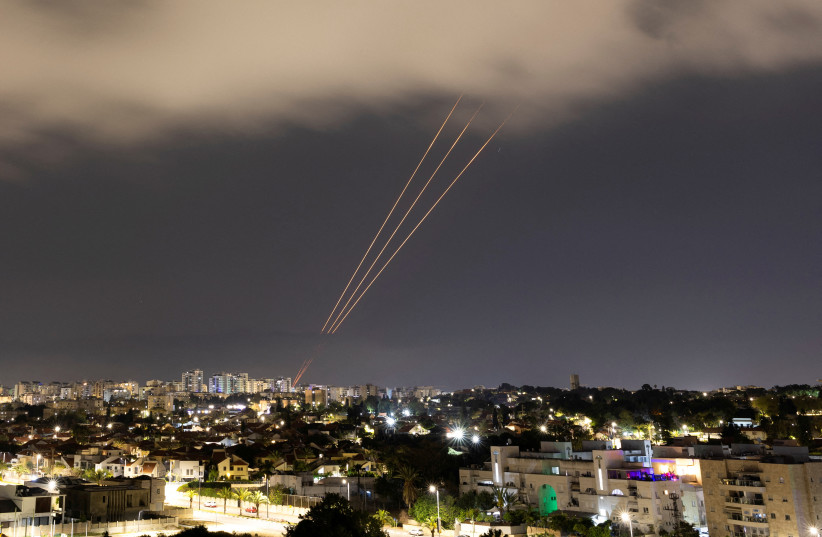In the age before Hamas’s October 7 massacre, the air defense operation that successfully intercepted Iran’s air assault against Israel would have seemed like a victory. Almost all (99%) of the over 300 missiles and UAVs launched by Tehran and its proxies were shot down by an international coalition led by the United States, and Israel emerged largely unscathed.
However, the failed paradigms that led to Hamas’s October 7 massacre have taught us that Israel and its allies, including the US, must not revert to a merely defensive posture. They must demonstrate clearly to Iran and the entire Middle East that there is a significant price to be paid for launching such attacks, even if they are deflected.
Before October 7, 2023, the dominant security paradigm in Israel was one that relied on defensive capabilities. Israel had become adept at shooting down Hamas rockets from the Gaza Strip with its Iron Dome system. Even as Hamas’s arsenal in Gaza grew more sophisticated, and Iran provided Hezbollah on Israel’s northern border with precise missiles, Jerusalem’s security concept remained grounded in preserving quiet to the extent possible by relying on its multi-layered air defenses. As long as damage to Israel’s home front could be minimized, the Jewish state could make do with limited strikes on the terrorist organizations that surrounded it.
This paradigm was supported not only by Israel’s military and political echelons, but also by the United States, which provided billions in support for Israeli air defense under the US-Israel 2018 Memorandum of Understanding. In 2022, Congress approved an additional $1 billion for Iron Dome. President Joe Biden’s November 2023 request for supplemental aid to Israel includes funding for 100 Iron Dome launchers.
This assistance has saved countless Israeli lives and Israelis are rightfully grateful for it. At the same time, this approach allowed Israel to tell itself that “defense is deterrence.” Jerusalem adopted the belief that the proper response to Tehran’s increasingly-dangerous efforts to build a ring of terror around Israel through its proxies in Gaza, the West Bank, Lebanon, Syria, Iraq and Yemen, was to build a defensive wall.

ON OCTOBER 7, that paradigm came crashing down. Despite all of Israel’s hi-tech systems, Hamas showed that it was not deterred, and launched a horrifically brazen and barbaric attack. One by one, Israel’s defensive systems failed to prevent Hamas terrorists from murdering more than 1,200 mostly Israelis and kidnapping more than 250 others, leading to the ongoing Israel-Hamas war. Israel’s reliance on its Iron Dome air defense made its security establishment overly-complacent in the face of Hamas, leading to a failure to detect the terrorist group’s plans for attacking Israel along other vectors.
In parallel, in line with its defensive posture, Israel evacuated the towns along its northern border, in order to move civilians out of the way of Hezbollah’s Iranian-funded missiles. It is not clear when the tens of thousands of internally displaced Israeli refugees will be able to return to their homes in the North.
On the night between October 13-14, Iran launched over 300 cruise and ballistic missiles and UAVs at Israel. Some 99% of them were intercepted by the Israeli, American, British and Jordanian militaries, reportedly with the involvement of Saudi Arabia and other countries as well. The successful response showed the utility of the nascent Middle East Air Defense architecture, built since the signing of the Abraham Accords.
According to media reports, President Biden told Israel’s Prime Minister Benjamin Netanyahu soon after the successful interception that Israel should see the results as a victory, and that the US would not support an Israeli counter-strike.
Israel stands at a critical crossroads. It must decide whether it has learned the lessons of its failed pre-October 7 security paradigm. If Israel accepts the demands for restraint, Iran and its proxies in the region will be emboldened. If Israel fails to respond today, the capabilities of Iran and its proxies will continue to grow more sophisticated and precise, month-by-month, year-by-year. If the US prevents Israel from launching a significant counter-strike, the entire world, including China and the Middle East, will conclude that the price for carrying out a massive attack against a US ally is limited.
The likely success of such an Israeli counter-strike, and the ability to limit its fall-out, will be greatly impacted by the degree to which the United States stands behind Israel. Most importantly, Jerusalem needs assurances that Washington will provide it with the armaments it requires.
What can the US do to help Israel?
Steadfast American support for an Israeli operation against Iran and Hezbollah will send a clear message to the Islamic Republic, while improving overall security in the region and laying the groundwork for future stability. A US-Israel show of unity and determination will lead Iran to limit its response. It must be remembered that the Iranian economy is in dire straits, with an increased reliance on energy sales to China and weapons sales to Russia. The ayatollah regime faces substantial opposition at home. Iran is therefore much more vulnerable to a strike targeting strategic assets.
President Biden warned Iran before it launched its attack with one word: “Don’t”. But Iran did. Now is the time to turn words into actions. Israel must demonstrate that it has learned the lessons of October 7, and will no longer make do with mere defense. The United States must show that its repeated assurances of “ironclad” support for Israel include the Jewish state’s ability not just to block blows, but to strike those who threaten its people.
The writer is senior managing fellow at the Misgav Institute for National Security & Zionist Strategy. He formerly held senior positions in Israel’s Strategic Affairs and Public Security ministries.
